The Black Sea is getting more and more into the focus of world politics, due to its long enduring conflicts in Georgia, Armenia and Azerbaijan as well as around Ukraine.
The Parliamentarian Assembly of the Black Sea Economic Cooperation Organization (PABSEC) is one of the important institutions where these conflicts play out – all sides of these conflicts are simultaneously member of the PABSEC, though Russia has frozen its activities due to Ukrainian provocations in the organization.
I asked the PABSEC’s Secretary General, Asaf Hajiyev, about the positioning of the Black Sea in world politics and the role his organization can play in resolving conflicts.
Black Sea is “where East and West confront each other”
What is the importance of the Black Sea Region in the global economy?
Our organization, comprised of 13 states and 81 parliamentarians representing them in our assembly, stands for a population of more than 300 million people, with its national income more than 3 trillion US dollars.
This is primarily due to the fact that the Black Sea today is a bridge between Europe and Asia. In addition, all global transportation routes pass through the Black Sea region: From the East to the West crosses the Silk Road, and the Northern Route, crossing from the north to the south. Thirdly, this is a region very rich in terms of energy resources.
Therefore, the Black Sea region has a distinguished position in global politics: Two forces, the West and the East confront each other here politically. Crises that occur in this region affect the world very negatively.
These are the reasons why this region is very important. For instance, our organization has 13 members. Besides of these, we have observing members. Which are these? France, Germany, the Czech Republic, Austria and the United States. They all have a guest status. This shows the importance of the Black Sea region for the world.
The recent conflicts in the region affect the European economy deeply. There are 7 different conflicts in the region currently, with one of them, the Armenian-Azerbaijani conflict that included a war over Karabakh, is coming to its end.
Azerbaijan has achieved its territorial integrity, which I think also constitutes a signal for Europe and the world. Because underneath of that conflict was a principle: the territorial integrity and sovereignty of states. The other conflicts should also be resolved based on these principles. If we do not enact this principle, the world might face a great problem.
US and Europe have “great interest in Zangezur corridor”
What consequences can follow for the region and the world from a normalization of relations between Armenia and Azerbaijan?
Once the conflict is resolved, the main issue will be the so-called Middle Corridor or the Zangezur Corridor. Why is that so important? Because today, goods depart from China and arrive at European and global markets, passing through the Black Sea region. But here is a problem.
If the Zangezur corridor is not opened, the transport of these goods will cause huge costs. If it is opened, the transport duration of goods from China to Europe decreases from a month to two weeks.
Besides, as far as I am informed, the Turkish company Arçelik has signed an agreement with Japan. According to that, the company got the markets of Pakistan, India, Bangladesh and Central Asia for durable domestic electronic goods. This corridor is very important to be able to deliver goods to these markets.
I think that Armenia should understand that and perceive that the opening of this corridor is very important for Armenia itself.
Azerbaijan has already declared that, should the corridor not be opened, Baku would use a transport route via Iran.
When the Baku-Tiflis-Ceyhan pipeline, the TANAP pipeline was planned, Armenia was presented an offer: ‘Retreat from the territories you have occupied, and this pipeline will pass through Armenia’. Bur Armenia rejected the offer, said ‘these are our lands’, but the history has shown how the territories were liberated.
Should Armenia reject to open the Zangezur Corridor, I think it will face a huge catastrophe, because of its geography. At the same time, Armenia is not such a rich state that it would be courted by others. Therefore, I think they will think carefully about it, and it should be opened soon.
Will this corridor also play a role in connecting energy resources in Central Asia with Europe?
Of course! In these days, the transport of gas and oil from Central Asia to Europe is being discussed. This should happen of course via this corridor and via Türkiye.
If this corridor is not opened, this transport will happen via Iran. But Western states object to a transport via Iran. Therefore, I think that this opening is very important for Europe and the United States, because the US also spends a huge effort to transport these gas and oil resources to the European and global markets. Important Us and British companies, such as Shell and British Petroleum as well as Central Asian companies are engaged here. Therefore, I think this is an important project for the whole world.
In your opinion, how does the crisis between Ukraine and Russia reflect on the Black Sea region?
This war has created big problems. Firstly, as you know, transports have come to a halt and the grain problem surfaced. On the other side, mines have been placed into the Black Sea, endangering maritime traffic.
Therefore, this is the biggest conflict in our region, and the whole world waits to see it resolved. I think that Russia is also interested in finding a solution. Here, the territorial integrity of states should be a very important principle. Without it, I cannot see a solution to this problem.
Can your organization play a role in the diplomatic solution of the conflict?
A diplomatic solution is of course very important. In all our sessions, Armenia and Azerbaijan, Ukraine and Russia, we also have the conflicts in Cyprus, in Kosovo, Georgia… The parliamentarians always bring these topics onto the agenda. And even if do not decide on a position or a resolution, it is discussed.
And I think our assembly can provide an opportunity for states to discuss their problems directly, so that their positions can get closer to each other. Therefore, our assembly can be a place to find a solution for these problems.
What do you think about increased NATO presence in the region?
There is the international agreement. Türkiye can, if it wants to, prohibit the passage of battleships. And it did so several times. This is Türkiye’s right.
The fewer battleships are in the Black Sea region, the better it is for the people. Because, I am Azerbaijani, and we know what war is. We fought for 30 years. I think that for every state, a war is a difficult task to pursue and of course, the ongoing wars should be stopped.
Thank you very much for this interview.
This interview was previously published on teleSUR TV in Spanish.







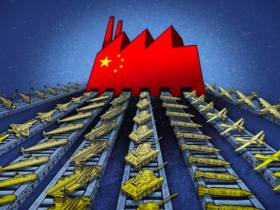
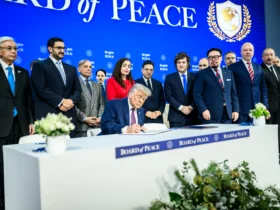
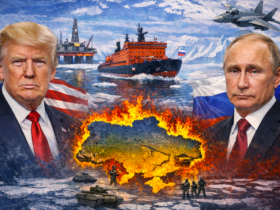

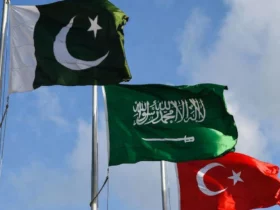
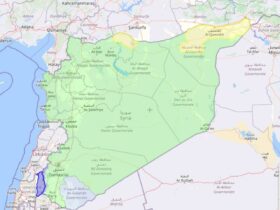

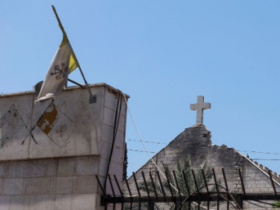

Leave a Reply